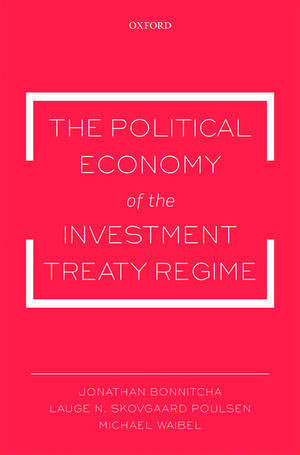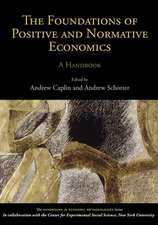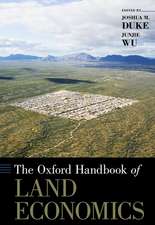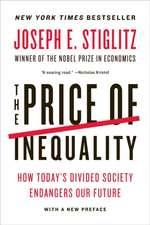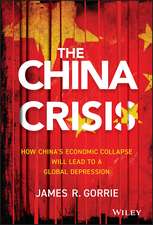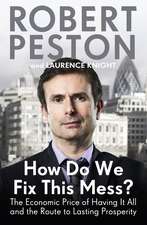The Political Economy of the Investment Treaty Regime
Autor Jonathan Bonnitcha, Lauge N. Skovgaard Poulsen, Michael Waibelen Limba Engleză Paperback – 20 iul 2017
| Toate formatele și edițiile | Preț | Express |
|---|---|---|
| Paperback (1) | 329.44 lei 31-37 zile | |
| OUP OXFORD – 20 iul 2017 | 329.44 lei 31-37 zile | |
| Hardback (1) | 703.83 lei 31-37 zile | |
| OUP OXFORD – 19 iul 2017 | 703.83 lei 31-37 zile |
Preț: 329.44 lei
Nou
Puncte Express: 494
Preț estimativ în valută:
63.04€ • 65.95$ • 52.37£
63.04€ • 65.95$ • 52.37£
Carte tipărită la comandă
Livrare economică 22-28 martie
Preluare comenzi: 021 569.72.76
Specificații
ISBN-13: 9780198719557
ISBN-10: 0198719558
Pagini: 368
Dimensiuni: 168 x 234 x 20 mm
Greutate: 0.55 kg
Editura: OUP OXFORD
Colecția OUP Oxford
Locul publicării:Oxford, United Kingdom
ISBN-10: 0198719558
Pagini: 368
Dimensiuni: 168 x 234 x 20 mm
Greutate: 0.55 kg
Editura: OUP OXFORD
Colecția OUP Oxford
Locul publicării:Oxford, United Kingdom
Recenzii
Amidst a sea of conflicting counsel comes a balanced yet hard punching analysis of the international investment treaty regime. With incisive analysis from the perspectives of economics, law and political science, the authors deliver a singularly important work of clarity at a critical time for global economic order. With as much a domestic perspective as an international one, the authors illuminate highly politicised questions with a fairness that is refreshing. As nationalist tendencies rise in several corners of the globe, this volume is must read for policymakers.
This is the essential introduction to the field that we have been waiting for: a comprehensive account of the international investment regime that integrates law with economic theory and political analysis. The authors have produced a seamless interdisciplinary study, laying out the state of knowledge on investment treaties in clear and accessible language, while pointing the way for future research. I expect that it will become a standard resource for students, scholars, and participants in the investment regime. Highly recommended!
This is a unique book on the political economy of investment treaties. It combines the rigor of academic research with the exploration of a highly salient public policy debate. By stepping back from the details of investment treaties and arbitrations, the authors construct a compelling argument on how the structure and implications of these collection of treaties and rulings create an investment treaty regime. This is a must read for anyone interested in the study of foreign direct investment or how globalization shapes the policies of nation-states.
The intense debates on investment arbitration and investment treaty regimes often provide more heat than light. Both supporters and detractors refer to conflicting studies and alternative facts in ways that makes it hard for those not already committed to make up their minds. The authors of this work have taken a hard look at the political economy of foreign investment and have been able to produce the most expansive fact-based background study combining the relevant legal, political and economic aspects. Their point has not been to provide advocacy for this or that position but to assist experts and decision-makers to form their views by reference to a realistic assessment of the relevant arguments. This is the best study of the functioning and effects of investment regimes to date.
A balanced and accessible study of the Investment Treaty Regime that will advance the global debate over foreign investors' role in economic, political and legal development. It clarifies complex issues, introduces non-specialists to a key institution, and proposes an ambitious agenda for future research.
This is the essential introduction to the field that we have been waiting for: a comprehensive account of the international investment regime that integrates law with economic theory and political analysis. The authors have produced a seamless interdisciplinary study, laying out the state of knowledge on investment treaties in clear and accessible language, while pointing the way for future research. I expect that it will become a standard resource for students, scholars, and participants in the investment regime. Highly recommended!
This is a unique book on the political economy of investment treaties. It combines the rigor of academic research with the exploration of a highly salient public policy debate. By stepping back from the details of investment treaties and arbitrations, the authors construct a compelling argument on how the structure and implications of these collection of treaties and rulings create an investment treaty regime. This is a must read for anyone interested in the study of foreign direct investment or how globalization shapes the policies of nation-states.
The intense debates on investment arbitration and investment treaty regimes often provide more heat than light. Both supporters and detractors refer to conflicting studies and alternative facts in ways that makes it hard for those not already committed to make up their minds. The authors of this work have taken a hard look at the political economy of foreign investment and have been able to produce the most expansive fact-based background study combining the relevant legal, political and economic aspects. Their point has not been to provide advocacy for this or that position but to assist experts and decision-makers to form their views by reference to a realistic assessment of the relevant arguments. This is the best study of the functioning and effects of investment regimes to date.
A balanced and accessible study of the Investment Treaty Regime that will advance the global debate over foreign investors' role in economic, political and legal development. It clarifies complex issues, introduces non-specialists to a key institution, and proposes an ambitious agenda for future research.
Notă biografică
Jonathan Bonnitcha joined UNSW Law as a Lecturer in July 2016. His primary area of research interest is international economic governance, with a particular interest in investment treaties. Much of his research is inter-disciplinary, drawing on perspectives from the disciplines of economics and political science. He has advised both developed and developing countries on investment treaties.Jonathan holds the degrees of DPhil, MPhil and BCL from the University of Oxford, and the degrees of LLB and BEc from the University of Sydney.Lauge Poulsen is a Senior Lecturer in International Political Economy at University College London. His research focuses on the theory and practise of economic diplomacy with a particular emphasis on foreign investment, dispute settlement, and international economic law. Prior to joining UCL Lauge was a Postdoctoral Research Fellow based at University of Oxford, Nuffield College.Michael Waibel is a University Senior Lecturer in International Law and Co-Deputy Director of the Lauterpacht Centre for International Law at the University of Cambridge, and a Fellow of Jesus College. His main research interests are public international law, international economic law with a particular focus on finance, and the settlement of international disputes. He teaches international law, WTO law, and European Union law.
